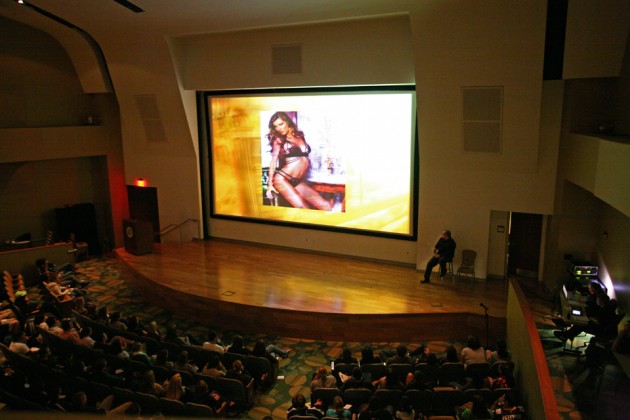Lecturer addresses USF students, the ‘porn nation’

Michael Leahy was 11 years old when he caught his first glimpse of pornography on a playground, a sight he said filled him with adrenaline, yet left him feeling guilty.
“I was so hyped up by the experience and the exposure I have never forgotten it,” he said.
It was this tumultuous relationship that led the former pornography addict and author of “Porn Nation: Conquering America’s No. 1 Addiction” to speak to students in the Marshall Student Center’s Oval Theater on Tuesday night.
Leahy spoke to a packed audience about the sex industry, what pornography is and how the current culture responds to the topic.
The porn industry releases about 11,000 new titles per year, he said, and the sex industry receives $27 billion of revenue worldwide. In the U.S., the industry produces $12 billion to $13 billion.
Leahy said there is a 2 to 1 ratio of adult film stores to McDonald’s in the U.S. The Internet, which hosts about 4.2 million commercial porn websites, attracts about 40 million daily users.
These statistics closely affect college student, he said, because 85 percent of 15 to 17-year-olds have been exposed to hardcore porn. Two assumptions that often attach themselves to pornography is that it is harmless and that those who “don’t like it, don’t look at it,” he said.
“If you think about it, those are two big assumptions for not just legitimacy of the adult industry,” he said, “but also the increased use of pornography by mainstream media.”
In a video, 20 college students and one tenured professor shared their opinions on pornography. While opinions were typically strictly pro or con, a majority of those interviewed said they were not “bothered” by the industry.
This indifference stems from sex images portrayed by the media, he said, a force all are affected by.
Leahy said sex can be a great thing for a relationship, but not when it is solely based on learned behaviors from pornography. Through the influence of pornography, men learn to be conquerors looking for adequacy and women fall into a role of finding value and love through “giving themselves” through sex.
Leahy experienced this firsthand when he entered into an affair after engaging in a 30-year relationship with pornography. The combination of the two eventually ended his 15-year marriage.
“Eventually, I had become fixated on the scenario that I had seen played out for years and years in pornography,” he said. “That was the simple scenario of a guy having sex with another woman that is not his wife.”
Leahy, who ended his lecture with the story of how he became a Christian, said the two biggest lessons he learned from his struggles was that sex creates measurable responses to the brain and that addiction is largely based on a faulty belief system.
The same neurological responses caused by alcoholism and drug use are targeted when one looks at pornography, he said. Through this, he came to realize that his addiction was not based on a moral failure alone.
“There are very similar effects when you start to pursue sexual content, sexual material and sexual stimuli,” he said. “This whole idea of becoming desensitized of certain material, this need to kind of up the ante, if you will, to look for something that’s more arousing, that’s more stimulating, really has nothing to do with values or anything to do with morality. It has more to do with the physiology and the nerve chemistry of the brain.”
The event was sponsored by Campus Crusade for Christ, who worked in conjunction with Fraternity and Sorority Life, Wellness USF, To Write Love on Her Arms and the Baptist Collegiate Ministry.
John Schneider, director of Campus Crusade for Christ at USF since 1998, said that Leahy spoke about four years ago at USF, Eckerd College and the University of Tampa, and that his message is still as powerful today.
“Michael does not advocate censorship,” Schneider said. “He just looks at what the reality is, what are the effects of reality and its impacts.”





